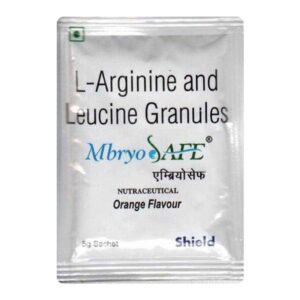LEUCINE + L-ARGININE
Leucine: Leucine is an essential amino acid, meaning it cannot be synthesized by the human body and must be obtained through the diet or supplements. It plays a vital role in protein synthesis and muscle maintenance.
Leucine has gained popularity as a dietary supplement, particularly among athletes and bodybuilders, due to its potential to enhance muscle growth and improve athletic performance. It is also used in medical settings to treat conditions such as protein malnutrition, liver disease, and loss of muscle mass in cancer patients.
The primary mechanism of action of leucine is its ability to activate the mammalian target of rapamycin (mTOR) pathway. Activation of mTOR stimulates protein synthesis, which promotes muscle protein building and repair. Leucine also helps regulate blood sugar levels by stimulating the production of insulin, aiding in the transport of glucose to muscles for energy.
The recommended dose of leucine varies depending on the individual’s age, health condition, and purpose for taking it. As a dietary supplement for athletic performance, typical doses range from 2 to 10 grams per day. However, it is essential to consult with a healthcare professional or a sports nutritionist for personalized dosing advice.
Leucine is generally safe when taken in recommended doses. However, high intakes of leucine may result in adverse effects such as gastrointestinal discomfort, diarrhea, and nausea. Additionally, excessive or prolonged use of leucine supplements may lead to imbalances in other branched-chain amino acids, such as isoleucine and valine.
It is important to note that leucine supplements should not be used as a substitute for a balanced diet. Consulting a healthcare professional is advisable before starting any new dietary supplement regimen, especially for individuals with pre-existing medical conditions or those taking prescription medications.
L-Arginine: L-Arginine is an amino acid that is naturally produced in the body and can also be obtained through diet. It plays a crucial role in various physiological processes and is often used as a dietary supplement.
One of the primary uses of L-Arginine is as a precursor to nitric oxide (NO), a molecule that relaxes and widens blood vessels, promoting improved blood flow. This vasodilation effect makes L-Arginine beneficial for conditions such as high blood pressure, erectile dysfunction, and intermittent claudication (leg pain due to poor circulation). It may also enhance exercise performance by increasing blood flow to the muscles.
The recommended dose of L-Arginine varies depending on the intended use. For improving exercise performance or treating erectile dysfunction, doses range from 2 to 6 grams per day. For cardiovascular conditions, doses may be higher, up to 9 grams per day. It is usually taken orally and can be found in capsules, tablets, or powders.
L-Arginine is generally considered safe when taken orally and in appropriate doses. However, it can cause some mild side effects such as stomach discomfort, diarrhea, and nausea. In rare cases, it may also lead to more severe adverse effects, including low blood pressure, allergic reactions, and worsening of asthma symptoms. People with certain medical conditions, such as herpes, kidney problems, or liver disease, should exercise caution when using L-Arginine.
Additionally, it is important to note that L-Arginine may interact with certain medications, including blood pressure medications, nitrates, and Viagra. Therefore, it is advisable to consult with a healthcare professional before starting L-Arginine supplementation, especially if you are taking any prescription medications.
Overall, L-Arginine is a widely used dietary supplement known for its potential benefits in improving blood flow and various health conditions. However, it is essential to use it under medical supervision and adhere to recommended doses to maximize its benefits while minimizing the risk of side effects.


